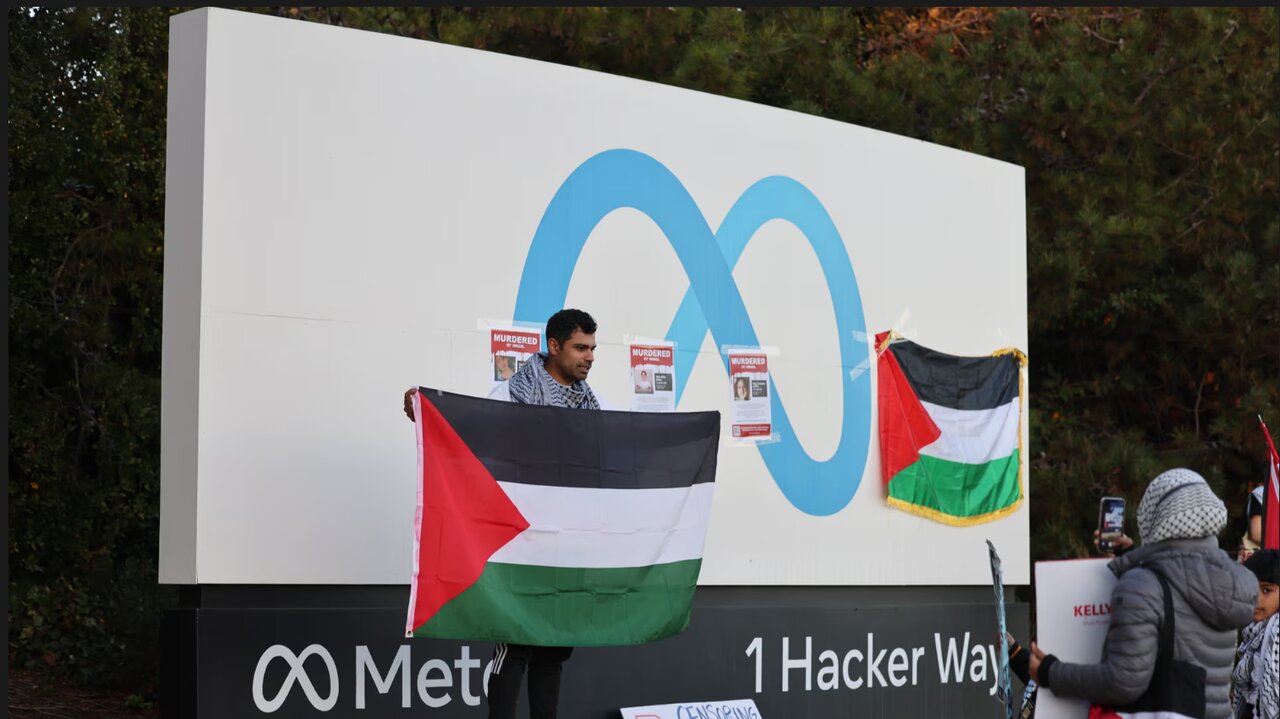Meta's role in silencing Palestinian narratives

TEHRAN - The current digital age, where social media serves as the primary tool for global communication, is seeing recent revelations about Israel’s efforts to block pro-Palestine content on Meta platforms (Facebook and Instagram), stirring widespread anxiety alongside heated discussions and anger.
The deliberate campaign by Israeli authorities to suppress critical narratives emerges from leaked information reported by sources such as Drop Site News, Al Mayadeen, and The Palestine Chronicle, which documents an extraordinary effort to silence dissent regarding its actions amidst the Gaza conflict.
On April 12, 2025, The Palestine Chronicle’s live blog emphasizes the severe nature of this crackdown by documenting Meta's deletion of 90,000 posts upon Israel's request within one day. This statistic, alongside Al Mayadeen’s report about Israel’s "directly orchestrated" efforts to suppress pro-Palestine narratives, depicts an intentional information control strategy.
Israel’s censorship efforts stand out as it targets international conversations instead of domestic content, setting it apart from other governments, which usually restrict their focus to internal media.
Mechanisms of control: collaboration and automation
This censorship system exposes a disturbing partnership between Meta and the Israeli regime. Meta did more than just passively follow takedown requests; it actively facilitated the Israeli government's mass censorship campaign by giving it a legal pathway to do so.
The evidence points to complicity that surpasses mere compliance, which prompts scrutiny regarding Meta’s purported neutrality and its possible alignment with governmental agendas.
The incorporation of artificial intelligence (AI) into censorship systems expands their reach while boosting operational performance. Posts on X suggest that Meta’s AI now automatically censors worldwide criticism of Israel, potentially eliminating human oversight and diminishing content creators' due process rights. This automated system speeds content removal while simultaneously creating a risk of excessive censorship which silences legitimate dissent without examination.
The lack of transparency in how these algorithms are programmed and the criteria they use adds another layer of concern, as does the potential for bias embedded in the training data.
Censorship’s legal and ethical implications
Legally speaking, Israel's censorship campaign highlights serious concerns about whether its censorship program adheres to international human rights law, notably the right to freedom of expression under Article 19 of the Universal Declaration of Human Rights.
The deliberate targeting of pro-Palestine voices as evidence of war crimes and genocide in Gaza creates an impression that censorship is aimed at manipulating public opinion about Israel while counteracting reputational damage and preventing accountability.
The legal determination from the International Court of Justice that Israel's conduct regarding Gaza could amount to genocide adds further complexity to the ethical discussion on censorship as an attempt to hide evidence and prevent witnesses from speaking.
From an ethical standpoint, we need to take a closer look at Meta's part in this operation. Meta, as a private company, doesn't have to follow the same rules as governments. But as it runs such big communication platforms worldwide, it has a moral duty to stand up for free speech. The company chose to put Israel’s requests ahead of its users' rights.
At the same time, it made exceptions for Israeli accounts. This seems like a double standard that undermines trust in its platforms.
Israel’s digital wall on Meta
The Israeli censorship activities on Meta platforms establish a perilous benchmark that threatens digital freedom.
Through its control of a major technology corporation, Israel constructed an intricate digital barrier that blocks the flow of information and suppresses dissent with unmatched severity. State entities and private firms use advanced technologies such as AI to establish mass surveillance and censorship as standard practices across the globe beyond the Israeli-Palestinian conflict.
The disclosures about Meta's assistance with the inquisition by Israeli censorship authorities highlight the urgent need for accountability, transparency, and content moderation policies that respect rights.
Social media platforms will continue to provide an essential site for political engagement and information sharing; therefore, digital rights and freedom of expression should remain an utmost priority.
To address this issue, international organizations, civil society, and technology companies must hold Israel and Meta accountable.
Actions such as transparency in content moderation policy, independent audits of AI systems, and legal challenges to extraterritorial censorship would be a good start. Simultaneously, journalists and activists must keep testing the limits of these practices.
Leave a Comment